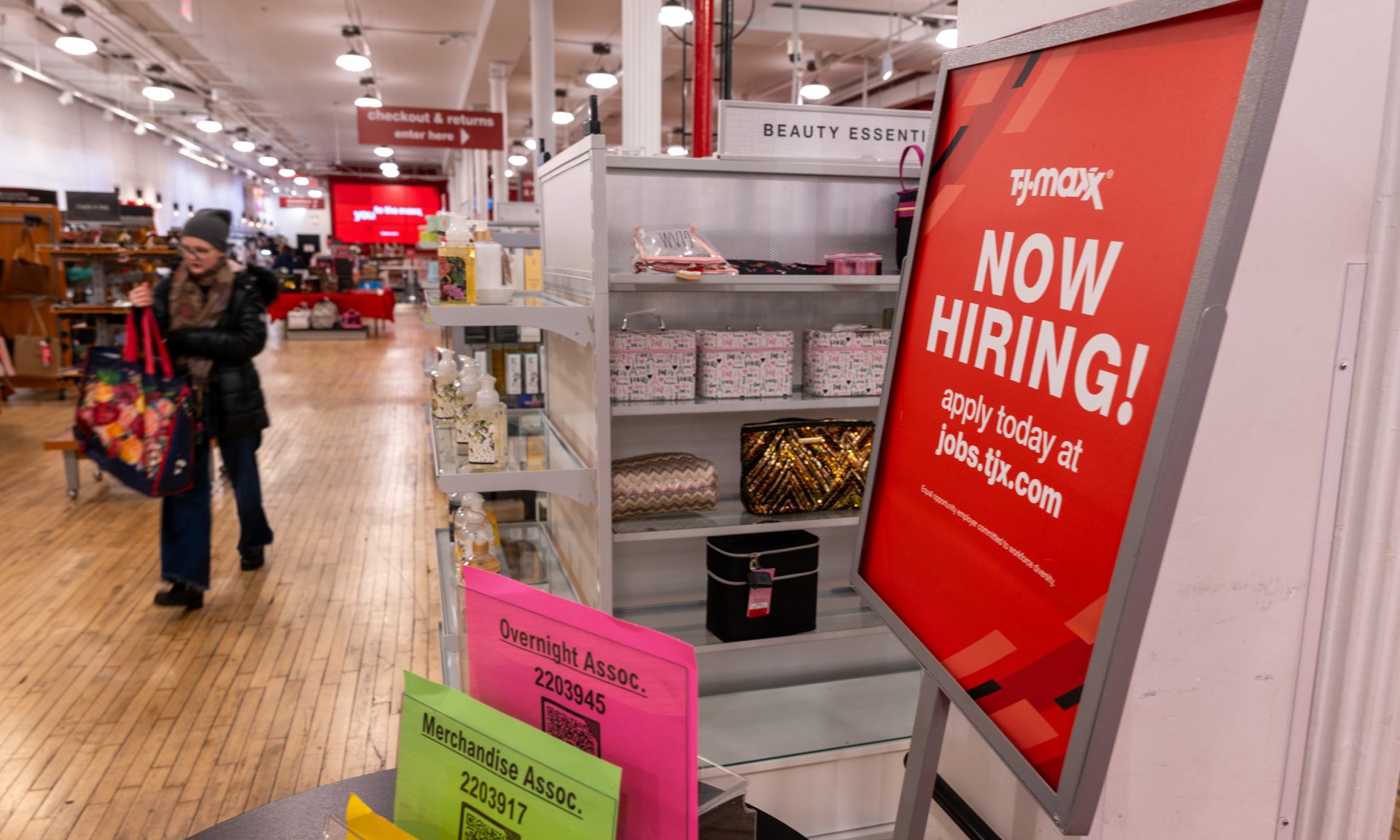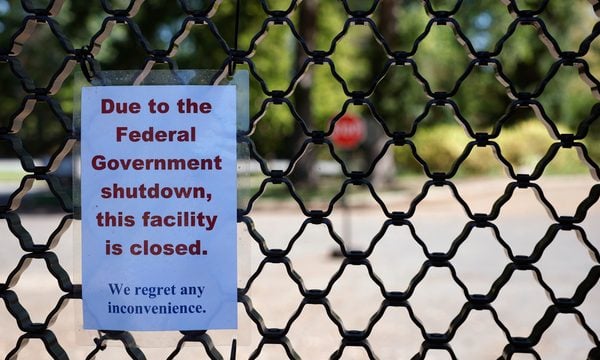Unemployment Ticks Down to 4.3%, Job Growth Flatlined in 2025
Only 181,000 jobs were added in all of last year, after a significant downward revision from the BLS.

Many, or all, of the products featured on this page are from our advertising partners who compensate us when you take certain actions on our website or click to take an action on their website. However, this does not influence our evaluations. Our opinions are our own. Here is a list of our partners and here's how we make money.
Updated on Feb. 12.
Job openings rose in January, but 2025 revisions raise red flag
Unemployment was 4.3% in January, compared to 4.4% in December, according to the January jobs report released by the Bureau of Labor Statistics on Feb. 11. Job openings came in above expectations at 130,000. That’s the good news.
The bad news is that revision figures in the report showed that job growth stalled in 2025: Only 181,000 jobs were added in all of 2025, compared to original estimates of 584,000. It’s also a far cry from the 1.46 million jobs added in 2024. More details below.
What are the weekly jobless claims?
Initial jobless claims fell for the week ending Feb. 7, according to the report released on Feb. 12.
Why it matters: The weekly jobless claims, or initial claims, are the number of unemployment insurance claims filed in the past week. They provide an indicator of the strength — or weakness — of the labor market.
Learn more about this week's jobless claims
Jobless claims were 227,000 for the week ending Feb. 7, a decrease of 5,000 from the previous week’s revised level of 232,000.
The new four-week moving average — a measurement of the number of people who filed for unemployment insurance for the first time over the last four weeks — was 219,500, up by 7,000 from the previous week's revised average of 212,500.
What's the insured unemployment rate?
Not all types of unemployment are included as part of the insured unemployment rate. It only includes "covered unemployment," as in people who receive unemployment benefits. Those who quit their jobs, for example, aren't included in the insured unemployment rate because they aren't eligible for unemployment benefits.
The advance seasonally adjusted insured unemployment rate — the rate of continuous covered unemployment claims divided by covered employment — was 1.2% for the week ending Jan. 31, unchanged from the previous week’s unrevised rate.
Job openings dropped in December
There were 6.5 million job openings in December, compared to 6.9 million in November, according to the latest Job Openings and Labor Turnover Summary (JOLTS), released on Feb. 5. The number of openings in November is roughly 966,000 lower than last year at the same time.
Here’s what Renter had to say about the latest JOLTS report.
Paltry job openings in December capped off a year of discomfort for people in search of a job. If there is good news in today’s data, it’s that hiring, quits and layoff rates remained steady. These figures don’t indicate further cooling at the end of the year, though the labor market may be leveling off at this chillier place.
Job openings can be thought of as forward looking. Rather than an action that an employer has already taken, openings signal what they’re hoping (or not hoping) to do soon. Hires, quits and layoffs, on the other hand, are things that have already been done. In this way, a decrease in job openings for the month of December could indicate employer uncertainty about the new year. Job openings haven’t been this bleak since 2020.
Job searchers likely don’t need today’s data to tell them the job market is slim pickings. Hiring remains lowest in manufacturing, government and financial activities industries. The state of the labor market, while not alarming, is certainly not one that lends itself to household financial security or positive economic sentiment.
The unemployment rate ticked down slightly in January at 4.3%, compared to 4.4% in December and 4.5% in November, according to the January jobs report released on Feb. 11 by the Bureau of Labor Statistics (BLS). The report was delayed due to the recent partial government shutdown that ended on Feb. 3.
Here are some takeaways from the latest report:
- Annual revisions to 2025 data shows a massive downward adjustment of jobs added by 403,000. The total number of jobs added in 2025 was 181,000.
- Job gains came in at 130,000 in January. The consensus forecast was an increase of 80,000, according to Morningstar, an investing firm.
- Job gains were revised down by 2,000 in December from 50,000 to 48,000. Gains were also revised down by 15,000 in November from 56,000 to 41,000. In total, employment in November and December was 17,000 lower than initial reports.
- Employment went up in health care (+82,000), social assistance (+42,000) and construction (+33,000).
- Employment in financial activities fell (-22,000).
- Federal government employment continued to decline (-34,000) in December. Total federal government employment is down 10.9% from its peak in October 2024.
- In January, average hourly earnings for all employees on private nonfarm payrolls increased 3.7% over the past 12 months, compared to a 3.8% 12-month increase reported in December.
» Stay informed: Check out NerdWallet's news hub for all the latest.
Meet MoneyNerd, your weekly news decoder
So much news. So little time. NerdWallet's new weekly newsletter makes sense of the headlines that affect your wallet.
What is the current unemployment rate?
The current unemployment rate is 4.3% for January, a 0.1 percentage point decrease from December (4.4%). The rate is higher than unemployment rates during 2023 and 2024.
The unemployment rate has risen since hitting a 50-year low of 3.4% in April 2023. Since May 2024, the unemployment rate has mostly stayed between 4% and 4.2%.
How the unemployment rate is calculated
The unemployment rate is calculated by dividing the number of unemployed people by the number of people in the labor force. (The labor force is considered the sum of those who are currently working or looking for work.) The result is then multiplied by 100 to get a percentage:
Number of unemployed people / Labor force x 100 = X%, which is the unemployment rate
Will unemployment go up soon?
The labor market showed signs of weakening throughout 2025.
The recent rise in unemployment was a byproduct of monetary policymakers’ effort to curb inflation by hiking interest rates. The Federal Reserve raised the federal funds rate 11 times between March 2022 and July 2023. Now that inflation is consistently slowing, the Fed has taken steps to prevent unemployment from rising further.
The Fed cut rates in 2024 at its September, November and December meetings. It paused rates at every meeting so far in 2025, but has indicated that there could be some rate cuts in 2025.
The Fed cut rates three times in 2025 before pausing in January.
» MORE: What is the minimum wage?
Are wages increasing?
Wage growth is moderating from what it was a year ago but is still higher than it was pre-pandemic, according to data from the Federal Reserve Bank of Atlanta. The three-month moving average of median hourly wage growth — when measured over the previous 12 months — has slowed from its peak in the summer of 2022.
For December, the three-month wage growth percent change was 3.7%, which is lower than the three-month moving average rate since November 2024.
What does the Employment Cost Index show?
Increases in compensation costs in the fourth quarter of 2025 slowed from earlier in the year, according to the most recent quarterly BLS Employment Cost Index, which measures wage and salary growth. Wages and salaries, as well as benefits comprise total compensation costs.
The December 2025 report, released on Feb. 10, shows compensation costs increased by 0.7% in the fourth quarter of 2025.
Year-over-year measurements show that compensation cost increases held steady in Q4 2025 (3.4%), just under the pace of the first three quarters and slower than the rates seen throughout 2024.
- Q4 2025: 3.4%
- Q3 2025: 3.6%
- Q2 2025: 3.6%
- Q1 2025: 3.6%
- Q4 2024: 3.8%
- Q3 2024: 3.9%
- Q2 2024: 4.0%
- Q1 2024: 4.2%
For the 12-month period ending in December 2025, wages and salaries increased 3.3%, compared to 3.6% for September 2025.
Benefit costs had a slightly lower increase in the 12-month period ending in December (3.4%) compared to September (3.5%).
More key jobs data and what it means
How many jobs were gained in January?
The economy added 130,000 in December, according to the BLS, well above expected gains. Here’s how many jobs were added in previous months.
- 48,000 in December.
- 41,000 in November.
- -173,000 in October.
- 119,000 in September.
- -4,000 in August 2025.
- 72,000 in July 2025.
- -13,000 in June 2025.
- 19,000 in May 2025.
- 158,000 in April 2025.
- 120,000 in March 2025
- 102,000 in February 2025.
- 111,000 in January 2025.
- 323,000 in December 2024.
What is the labor force participation rate?
The labor force participation rate changed little at 62.5% in January, compared to 62.4% in December, according to the Bureau of Labor Statistics.
Why it matters: The labor force participation rate is the percentage of the population that is working or looking for work.
The rate is calculated as the labor force divided by the total population that’s eligible to work. (The Bureau of Labor Statistics defines the total population that’s eligible to work as the “civilian noninstitutional population,” which refers to people ages 16 and older who are not in military service or incarcerated.) The result is multiplied by 100 to get a percentage:
Labor force / Civilian noninstitutional population x 100 = X%, which is the labor force participation rate
Since October 2002, the labor force participation rate was lowest in April 2020 (60.1%) and highest in June 2003 (66.5%), according to BLS data.
How many job openings were there in December?
The latest Job Openings and Labor Turnover Summary (JOLTS), released on Feb. 5, shows job openings were 6.5 million compared to:
- 6.9 million in November
- 7.4 million in October.
- 7.7 million in September
- 7.2 million in August
- 7.2 million in July
- 7.4 million in June
- 7.7 million in May
- 7.4 million in April
- 7.2 million in March
- 7.5 million in February
- 7.8 million January
- 7.5 million in December
- 8 million in November
- 7.6 million in October
The seasonally adjusted job openings rate in December was little changed from November at 3.9%. The job openings rate in December 2024 was also 3.9%.
The number of job openings went down in professional and business services (-257,000), retail trade (-195,000), and finance and insurance (-120,000).
What is the layoff rate?
The rate of layoffs in December (1.1%) was unchanged from November, according to the most recent JOLTS report. Layoffs and discharges rose in transportation, warehousing, and utilities (+103,000), but fell in finance and insurance (-20,000).
What is the quit rate?
The JOLTS report also shows the quit rate in December was 2%, unchanged from November. Quits fell in professional and business services (-151,000) and in private educational services (-19,000). Quits rose in retail trade (+87,000) and in information (+28,000).
Why it matters: Economists say quit rates are a key factor in the health of employment prospects since quitting shows that workers feel safe making a job switch within their sector or outside it entirely.
The current quit rate is consistent with pre-pandemic levels after peaking at 3% in both Nov. 2021 and April 2022.
When is the next jobs report?
The next jobs report will show data for February and it will be released on March 6.
(Photo by Spencer Platt/Getty Images News via Getty Images)
Article sources
NerdWallet writers are subject matter authorities who use primary,
trustworthy sources to inform their work, including peer-reviewed
studies, government websites, academic research and interviews with
industry experts. All content is fact-checked for accuracy, timeliness
and relevance. You can learn more about NerdWallet's high
standards for journalism by reading our
editorial guidelines.
Related articles





